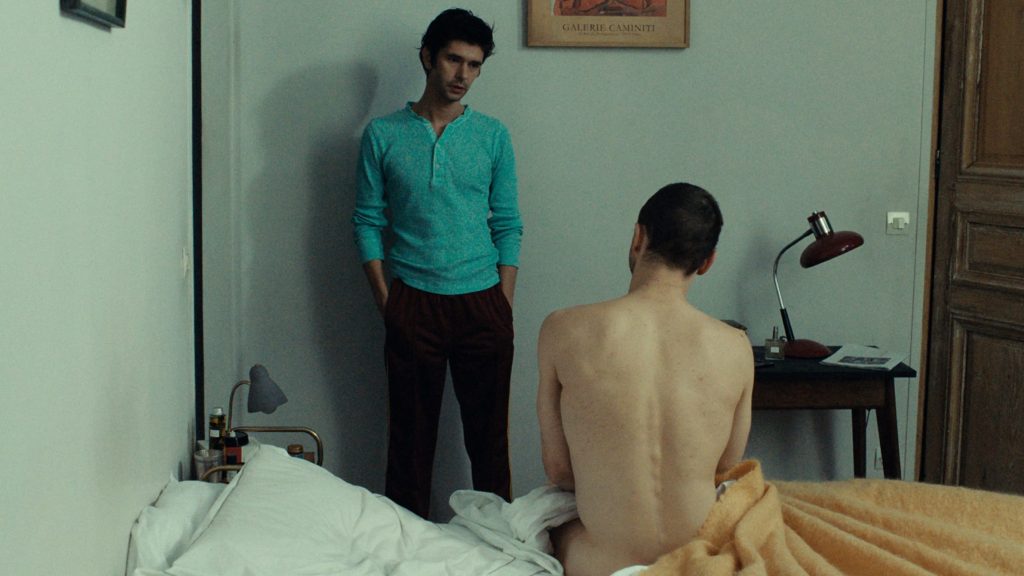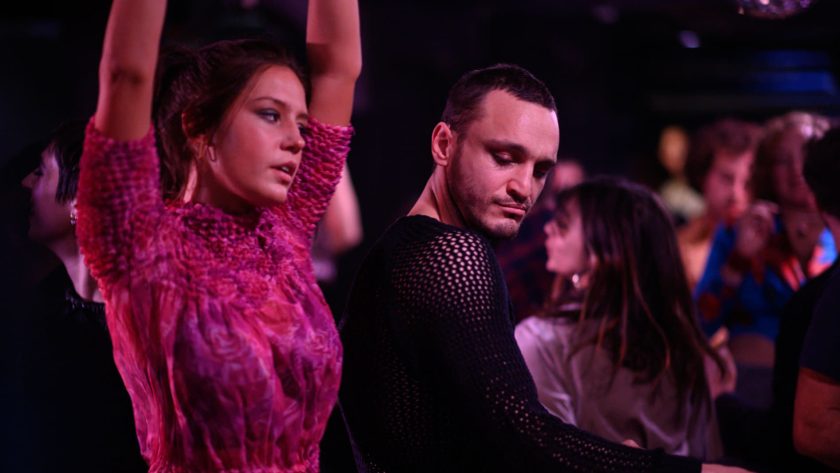The FilmSoc Journal is back for the 73rd edition of Berlinale, with critic Aryan Tauqeer delivering a look at the hits and misses of the upcoming 2023-4 season of cinema.
Aryan Tauqeer reviews Ira Sachs’ Passages, a richly observed whirlwind of a melodrama set in Paris, where the relationship between a narcissistic filmmaker and his husband begins to fall apart when one of them begins a relationship with a woman.
One of the first distinct sounds amidst a background of chatter in Ira Sachs’ Passages is that of a clapperboard. A line delivery is repeated-nay, hammered– into the ground until the imperious director overseeing the scene, Tomas (Franz Rogowski), is satisfied. As Tomas berates a young performer for not truly understanding the context within which his seemingly offhand line is delivered, it becomes increasingly apparent that the conversation is less about which the achievement of perfection- an ideal that Tomas, at the cost of much of his dignity, attempts to achieve throughout the film- and is instead far more telling with regards to what fuels him. For all that this scene does to establish Tomas as someone in a nigh-perpetual state of conflict with the people around him, it is doubly revealing as an instrument for what Sachs’ personal concerns with his first film since 2021’s Frankie are- it is no accident that our introduction to Tomas and husband/oftentimes lover Martin (Ben Whishaw) is through an image of artifice. It is through the chronicle of a relationship in flux and all the debris that its end leaves in its way that Sachs explores not simply artifice as the foundation for said relationship, but artifice as a foundation for constructing a sense of self that simply wouldn’t exist without it.
Part of this artifice is Sachs’ homaging of the films and personal life of Rainer Werner Fassbinder, notably his many torrid relationships with men and women both on and off set- in many ways, a clear parallel to Tomas and what appears to be his fundamental requirement for constant change, be it in partners or in what he plans to do with his films. As with Fassbinder, however, discussing Tomas purely as a “toxic” presence is by far the least interesting context within which to deliberate upon precisely why he has such a penchant for abandonment; self-destructive he may be, but a terrible person he is not- at least according to Sachs, whose script is acutely aware that Tomas’ promiscuity is no indicator of his wants and fears. That awareness translates to the performances at play, with Whishaw manoeuvring his established onscreen sensitivity into a figure of wear and worry, whose desire to stay rooted in a place of relative security is at constant and embittered odds with Tomas’ implacable desire for fluidity. Similarly, Agathe (Adèle Exarchopoulos) embodies the excitement in Tomas’ life so desperately strives towards, and yet is always on the edge, conspicuously aware of her lover’s short-lived satisfaction with things as they are. In cohesion, they establish a dialogue, despite their scarce interaction during the course of the film, that is so hopelessly inextricable from Tomas that it becomes genuinely painful when they first do come into contact, for they are seemingly the only two people in the film who love (and hate) the loud-mouthed director whose affection they are constantly spurned by.

What also becomes increasingly evident throughout the course of the film is that the unspooling of these potent, prematurely aborted obsessions are largely within the confines of bedrooms- with the exception of a particularly contentious familial fallout towards the end of the film, the crises undergone by Passages’ characters are largely private and largely circumstantial. As if staging a comedown from a euphoric high, Sachs orchestrates grand tableaus of decay within the most unseemly places, often utilizing blocking in a manner that renders the position of a character as much of repartee as their acid-tongued exchanges- there’s a particularly telling image around halfway through the film, where Martin is obscured from view by Tomas whilst sitting on his bed, with the latter posing a threat to the former’s newfound stability after putting some distance between them. That decay translates to the performances as well, with Rogowski, in particular, becoming something of a wounded animal as he alienates those closest to him, writhing with indecision as he grovels for a kind of forgiveness that he has long surrendered the right to receive. Rogowski’s own keen grasp over the performative faculties offered to him by the distinctiveness of his face (which he demonstrates in a relatively reserved fashion in his other Berlinale premiere this year, Disco Boy) – there’s a slight but noticeable dissonance between the rigidity of his features and the soft-spoken lisp that he weaponises in his performances. Where that dissonance manifests as a delicacy in his collaborations with Christian Petzold, here it is employed as an instrument of viciousness, which Exarchopoulos and Whishaw are hopelessly drawn to until Tomas’ demands finally create an irreconcilable contradiction between what they so desperately want from him and what he really is: an overgrown child.
None of these performances, of course, would produce quite the effect that they do were it not for the milieu that they reside within- specifically, Paris and its quaint cafes and clubs, which contribute to another combative facet of Tomas’ identity- namely, his identity as a French-speaking German, whose stark dismissal to maintain any sentimental attachments to the city around him are the source of endless anxiety for his various lovers and the families, who fear that he may decide to uproot himself at any given moment. In a press conference at the festival, Sachs admitted that the decision to film in Paris was an adjustment necessitated by the pandemic, altering his plans to initially shoot the film in New York (much like Love Is Strange). As with Love Is Strange, Sachs’ portraiture of queer love is not, like so many of the festival circuit obsessions that have enraptured audiences in recent years, especially romantic. His characters are always aware of the cost, financial and otherwise, of their devotion to their careers and partners, and a rather ruthless pragmatism often overpowers any poetic notions of perseverance. The trio at the centre of the film may cast the figures of characters out of a Jacques Demy film, with Exarchopoulos’ outfits clearly evoking Bardot in Le Mépris and Rogowski donning fishnet crop tops whilst dancing under strobes of pink and purple, but as with Demy’s films, the ecstasy of such luxuries wears thin and wears out even faster. None of these people change much, if at all, but it is their steadfast and ultimately tragic commitment to becoming the worst version of themselves that lends Passages so much of its potency.
Passages will premiere in the UK on 7th July, as part of the Sundance London programme. The film will begin its theatrical release in the UK on 1st September. Watch the trailer for the film here:




